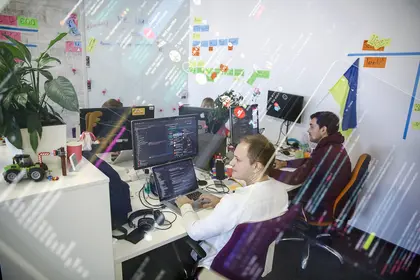Ukrainian tech companies are losing money because they lack tech specialists. Judging by how quickly they grow, tech firms need about 50,000 techies a year, while there are only a bit over 16,000 tech students graduating from Ukrainian universities every year.
By 2024, the situation will have improved only slightly, according to recent estimates.
Ukraine will see a 23% increase in the number of tech students graduating yearly in Ukraine in 2024, reaching 20,000 people, according to Better Regulation Delivery Office (BRDO), a European Union-funded non-governmental organization.
But the situation will start to really improve only in 2030, when there will be 38,000 graduates — almost as many as the market needs to thrive, BRDO estimates.
Ukraine’s tech education is outdated and unable to satisfy the demands of the local market, according to Ihor Samokhodsky, an expert from BRDO. However, more young Ukrainians will study tech, because they are tempted by high salaries and the abundance of job offers that the tech industry can offer, he said.
For Ukraine, hiring more tech staff is good too. According to estimates, one employed programmer brings nearly $35,000 worth of exported goods every year and promotes Ukraine’s image as a technological hub, experts said.
Benefits
The Ukrainian tech industry grows by 30% annually, securing over $4 billion in exports and paying about $590 million in taxes. The industry employs roughly 182,000 techies, but it’s not enough. In the last five years, the number of vacancies for Ukrainian techies has increased by nearly 30%, according to the local tech company GlobalLogic.
Specialists who work with programming languages like Python, JavaScript, Java and C++ are in the highest demand, GlobalLogic said. On average, tech developers in Kyiv earn $2,300 a month, while the average salary in Ukraine is $440 a month.
According to BRDO, Kyiv is the most popular city to study IT — over 28% of Ukraine’s future tech specialists study there. Almost 85% of all Ukrainian techies live in the country’s five big cities — Kyiv, Kharkiv, Lviv, Dnipro and Odesa.
Graduates from Ukraine’s Donetsk National Technical University, Taras Shevchenko National University of Kyiv and Kyiv’s National Technical University earn the most, the statistics show.
However, over the last few years, more local techies have flocked to western Ukraine, looking for cheaper accommodation, more convenient logistics and better ecology. According to a survey by Ukrainian online tech portal Dou.ua, Ukraine’s western cities Ivano-Frankivsk, Lviv and Vinnytsia are the most comfortable cities for the local tech specialists.
Problems
With all the benefits that Ukraine offers, its tech industry could have thrived had it not been for the lack of proper education, brain drain and the lack of incentives to sell products within the country.
Many Ukrainian students complain that they don’t have laptops and high-speed internet connection to study information technologies in local universities. Besides, universities do not keep up with the recent developments and do not teach skills that will help to succeed in the workplace, students told the Kyiv Post.
University professors complain too: With an average salary of nearly $1,200 a month they don’t have incentives to teach.
Ukraine tries to attract tech graduates with low taxes and high salaries but foreign businesses usually offer more. According to Dou.ua, nearly 75% of Ukrainian specialists want to move to the U.S. or Western Europe, while only 25% want to stay in Ukraine.
But even those who stay usually sell their services abroad. Ukraine is ranked second in the world after India by number of outsourcing companies. Twenty-one Ukrainian firms are ranked among the world’s top 100 tech outsourcers.
Tech entrepreneurs who found startups move abroad too. Most popular Ukrainian startups like Grammarly, People.ai and GitLab are registered in the United States and pay their taxes there.
Opportunities
According to the BRDO, there are two possible ways to increase the number of people who work in the local tech industry. The first is to teach people from other industries how to code.
To that end, local tech companies and nonprofits organize free courses like The Basics of Web Development from Ukrainian online course provider EdEra or online courses from Prometheus.
Another way is to attract tech specialists from abroad. For many foreign techies, Ukraine is not a popular destination because of the flawed judiciary, widespread corruption and omnipresent bureaucracy. However, experts said that Ukraine’s IT has a lot of opportunities.
For example, Ukraine has one of the lowest taxes on revenue for entrepreneurs (5%), while most of the programmers in Ukraine are registered as individual entrepreneurs.
You can also highlight the text and press Ctrl + Enter




